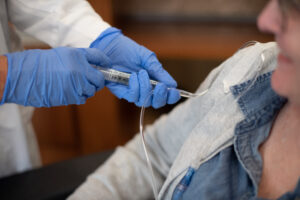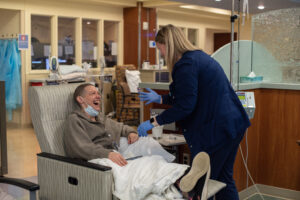Chemotherapy is one of the most common treatments prescribed to fight cancer. If you’re curious or nervous about starting chemotherapy, you’re not alone. We’ll walk you through what chemotherapy is and what to expect from your course of treatment.
What Is Chemotherapy?
One of the most common types of cancer treatment, chemotherapy uses drugs to kill fast-growing cancer cells and prevent them from multiplying. Chemotherapy typically destroys the cells’ DNA and disrupts cell division to prevent further reproduction.
Depending on the type of cancer, chemotherapy treatment can:
- Ease cancer symptoms by shrinking tumors
- Slow the growth of cancer cells to keep them from spreading
- Kill them to the point where they are no longer detectable in your body
Chemotherapy Drugs
There are several different chemotherapy drugs available, which are categorized by their composition. Each type of chemotherapy drug will destroy cancer cells at different phases in their reproduction and through different means. The most common type of chemotherapy drug is an alkylating agent, which works by destroying the functions of DNA in cancer cells and preventing them from dividing.
Chemotherapy drugs can be administered through an injection, intravenous drip into a vein, topical cream rubbed onto the skin, or pill or liquid taken orally. Your treatment may be a single drug or a combination of several. Combinations are often used because they can attack cancer cells through different methods, and the cells are less likely to build up resistance. Your oncologist will determine the best drug or combination of drugs for your chemotherapy treatment.
Creating a Chemotherapy Treatment Schedule
Your care team will design a chemotherapy treatment schedule to be as effective as possible while still ensuring that you have time to rest and recuperate each time you receive the drugs. Every patient and treatment plan is unique, and your oncologist will help you understand the process and adjust the plan based on new information.
Chemotherapy treatment schedules can vary depending on the type of cancer, its stage of advancement, and the type of drugs that are used. Since most forms of chemotherapy attack cells when they are reproducing (and not all cancer cells will be reproducing at the same time), the drugs need to be administered in cycles for maximum effectiveness. For instance, you might receive one week of chemotherapy drugs followed by three weeks of rest.
The rest period also gives your body a chance to build new, healthy cells before starting another round. Since cancer cells are typically unable to recover as quickly as your body’s healthy cells, each round will kill off more cancer while avoiding permanent damage to your body.
It’s important that you receive enough sleep and drink plenty of fluids during your rest cycle. You should also avoid people who are sick, since chemotherapy treatment will weaken your immune system.
A treatment course typically lasts between three and six months. Within that time, you will have between four and eight cycles of chemotherapy. We will constantly monitor your physical health during the course of treatment to see how your body is responding and adjust the schedule accordingly. Our care coordinators are also here to help you understand your chemotherapy treatment plan and answer any questions you have throughout the process.
Chemotherapy Treatment at CHC
The Cancer & Hematology Centers specialize in providing the cutting-edge chemotherapy treatment of a major healthcare institution while maintaining the personal touch of a smaller system. We’ll ensure that you receive the best chemotherapy treatment available, while also receiving support for your mental, emotional, and financial well-being.
We are the largest physician-owned oncology and hematology practice in Michigan, with more than two dozen highly trained and skilled oncologists on staff. Our nurses are certified in chemotherapy administration, and many of them are also oncology certified.
CHC patients also have access to clinical trials of experimental chemotherapy treatments through our partnership with START Midwest. START is a world-leading organization in advancing cancer research and working to find a cure. The clinical trials that our patients are able to access through this partnership provide hope and opportunities through the most challenging battles with cancer.
CHC’s multiple locations available throughout West Michigan enable our patients to receive world-class chemotherapy treatment while staying close to home. In addition to providing chemotherapy treatment, our locations have amenities such as pharmacies and support services for our patients’ convenience.
Compassionate Care
Undergoing chemotherapy treatment is one of the most challenging times in a person’s life, which is why CHC provides a wide range of resources, expertise, and support to help our patients deal with the physical, emotional, and financial stresses that it presents.
That network of support includes our Behavioral Oncology program to treat feelings of fatigue, insomnia, depression, and anxiety. We also have social workers on staff to connect patients and their families with necessary resources, including financial coordinators and support groups.
Every member of our team practices compassionate care and will take the time to listen to your concerns and answer questions. Our care coordinators are also on hand to serve as your personal guide by answering questions and ensuring that the experience is as seamless and comfortable as possible.
CHC’s Survivorship program focuses on long-term care that occurs after your chemotherapy treatment has ended and takes a holistic approach to your overall well-being. It connects our patients to resources such as our Bone Health Clinic and Women’s Health Clinic.
Ready to Start Your Chemo Treatment?
Give us a call at (800) 411-7999 to talk to our staff about starting chemotherapy treatment at CHC. Be sure to check out our locations to find the one closest to you.
Frequently Asked Questions
What Is the Next Treatment After Chemotherapy?
The next stage after your chemotherapy treatment will depend on how much of the cancer has been eradicated and whether further steps, such as surgery or radiation, will be required. CHC patients can join our Survivorship program, which involves regular medical checkups and access to resources that focus on improving patients’ physical and mental well-being.
How Much Does Chemotherapy Cost?
The cost of chemotherapy treatment can quickly reach tens of thousands of dollars. That’s why CHC has financial coordinators on staff to help our patients manage the costs of their treatment.
Is There an Alternative to Chemotherapy Treatment?
The harsh side effects of chemotherapy treatment lead many patients to look for alternative treatment options, which can include surgery, radiation, immunotherapy, and targeted therapies. CHC’s staff will offer you the most effective treatment options available for your cancer and talk through each of them in depth.
What Are Chemotherapy Side Effects?
Chemotherapy can cause a range of side effects that may occur both during and after your treatment. The side effects of chemotherapy treatment can lead to pain, discomfort, and exhaustion, which is extremely taxing for any individual. Common side effects include:
- Nausea and vomiting
- Fatigue
- Weakened immune system
- Fever
- Diarrhea
- Constipation
- Dehydration
- Depression
- Hair loss
- Loss of appetite
- Mouth sores
- Anemia
Our care team will work with you to help you manage any discomfort during this time. CHC also offers palliative care, a Behavioral Oncology program, and a network of support groups to help with the physical, emotional, and mental challenges that chemotherapy treatment can bring.
Call us for same-day care at (800) 411-7999 if you experience any of the following:
- Fever, chills, or a temperature of 100.5 F or greater
- Vomiting or uncontrolled nausea
- Diarrhea that can’t be controlled by Imodium A-D
- Shortness of breath
- Feelings of unsteadiness, dizziness, or lightheadedness
- Mouth sores


